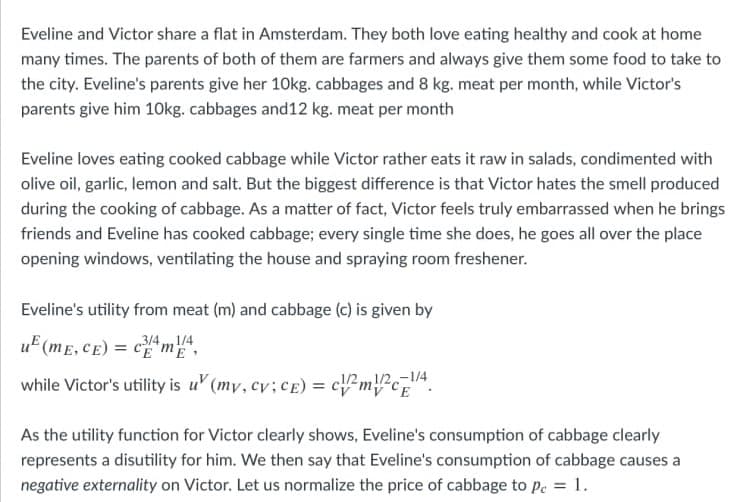Principles of Economics 2e
2nd Edition
ISBN:9781947172364
Author:Steven A. Greenlaw; David Shapiro
Publisher:Steven A. Greenlaw; David Shapiro
Chapter6: Consumer Choices
Section: Chapter Questions
Problem 1SCQ: Jeremy is deeply in love with Jasmine. Jasmine lives where cell phone coverage is poor, so he can...
Related questions
Question
a. Suppose a market is introduced for the externality Eveline causes on Victor. Let us denote by px the
b. Derive the market allocation corresponding to the new competitive equilibrium of the economy formed by Eveline and Victor (ce, me) and (cv,mv).
c. Is the new competitive equilibrium Pareto efficient?

Transcribed Image Text:Eveline and Victor share a flat in Amsterdam. They both love eating healthy and cook at home
many times. The parents of both of them are farmers and always give them some food to take to
the city. Eveline's parents give her 10kg. cabbages and 8 kg. meat per month, while Victor's
parents give him 10kg. cabbages and12 kg. meat per month
Eveline loves eating cooked cabbage while Victor rather eats it raw in salads, condimented with
olive oil, garlic, lemon and salt. But the biggest difference is that Victor hates the smell produced
during the cooking of cabbage. As a matter of fact, Victor feels truly embarrassed when he brings
friends and Eveline has cooked cabbage; every single time she does, he goes all over the place
opening windows, ventilating the house and spraying room freshener.
Eveline's utility from meat (m) and cabbage (c) is given by
uF (mE, CE) = CE mE.
3/4 1/4
while Victor's utility is u (my, cv; cE) = cmcA.
1/2,-1/4
As the utility function for Victor clearly shows, Eveline's consumption of cabbage clearly
represents a disutility for him. We then say that Eveline's consumption of cabbage causes a
negative externality on Victor. Let us normalize the price of cabbage to pe = 1.
Expert Solution
This question has been solved!
Explore an expertly crafted, step-by-step solution for a thorough understanding of key concepts.
Step by step
Solved in 5 steps with 14 images

Knowledge Booster
Learn more about
Need a deep-dive on the concept behind this application? Look no further. Learn more about this topic, economics and related others by exploring similar questions and additional content below.Recommended textbooks for you

Principles of Economics 2e
Economics
ISBN:
9781947172364
Author:
Steven A. Greenlaw; David Shapiro
Publisher:
OpenStax



Principles of Economics 2e
Economics
ISBN:
9781947172364
Author:
Steven A. Greenlaw; David Shapiro
Publisher:
OpenStax



Principles of Microeconomics
Economics
ISBN:
9781305156050
Author:
N. Gregory Mankiw
Publisher:
Cengage Learning